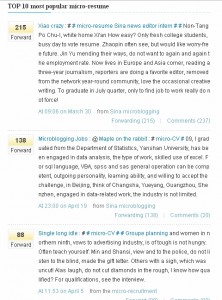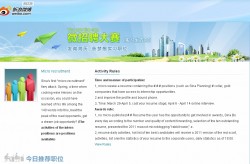 Credit the Chinese for coming up with the latest trend in recruiting: The micro-resume.
Credit the Chinese for coming up with the latest trend in recruiting: The micro-resume.
Not those qualifications on a business card that made the rounds of networking events a few years ago, but a resume reduced to 140 characters.
Ever since China’s leading micro-blogging site weibo.com launched a jobs service in late March, 140-character resume summaries have mushroomed. One count in May put the number at 17,000.
Graduating students were the earliest adopters of the micro-resume, sending brief messages noting their academic degree, interest, and experience. Other job seekers have also begun to take to the micro-resume. A Xinhua article quotes a senior manager who posted his own micro-resume praising their efficiency.
Recruiters are also taking to the service, broadcasting micro-job posts to the site. On the home page of the Sina recruiting site are company profiles for Manpower, Panasonic, and Alipay, China’s equivalent of PayPal, among others.
The site also lists the 10 most popular micro-resumes, selected, presumably, on the basis of the number of forwards. (Retweet they would be called, if on Twitter, which, incidentally, is banned in China.)
If you take a look at the micro-resumes, you’ll immediately notice that Google’s English translation (pictured above) runs much longer than 140 characters. That’s where language makes a difference and may keep the micro-resume from gaining much popularity in that part of the world that uses the Latin alphabet.
 China’s alphabet allows users to convey far more information in 140 characters than does English.
China’s alphabet allows users to convey far more information in 140 characters than does English.
That hasn’t stopped recruiters in the U.S. and Europe from tweeting job postings to their followers. Typically, these are two or three word descriptions with a link to the full post. Occasionally, Twitter using job seekers will do the same, with a link to an online resume or LinkedIn address.
Once tweeted, however, these jobs and resume pointers descend down a follower’s list, disappearing with a rapidity dictated by how many Twitter connections a person has. Sina’s micro-blogging job service works differently, indexing and highlighting jobs and resumes. Instead of sorting things the way Twitter does — by a chaotic system of hashtags — Sina created a separate site for the recruiting service.
Whether the micro-resume has legs even in China remains to be seen. The Xinhua report quotes one HR director who has doubts:
Wang Dong, a human resources director working for an online advertising company, says that he is very cautious when dealing with microresumes. He believes that they aren’t long enough to provide a suitable introduction for employers.
“Microresumes aren’t necessarily suitable for every industry,” Wang says. “Advertisers and media companies are the most suitable targets for this kind of recruitment.”